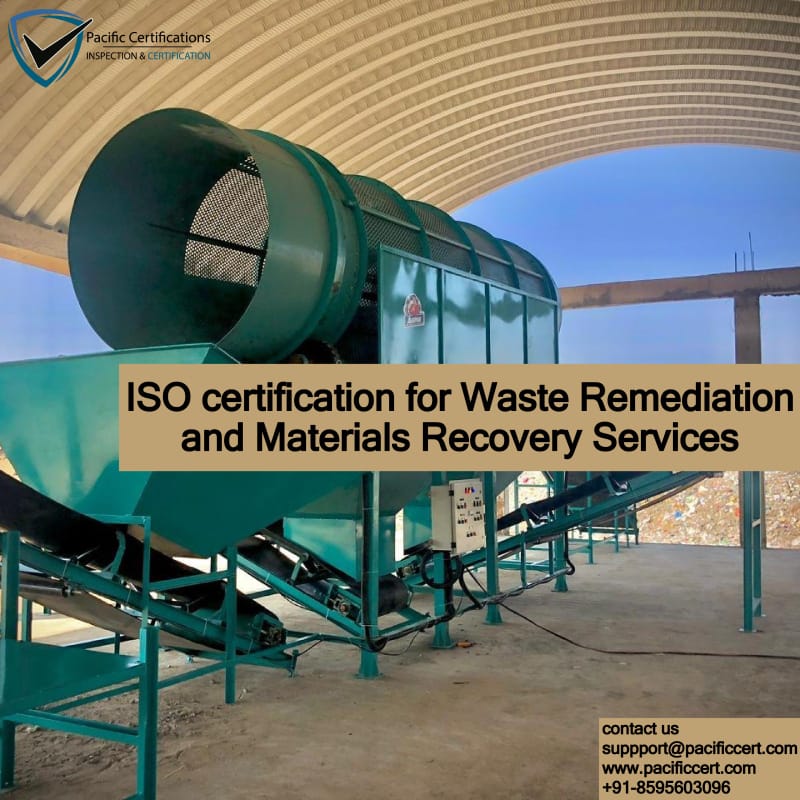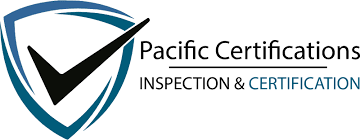ISO Certifications for Waste Remediation and Materials Recovery Services, Requirements and Benefits

Introduction
Waste remediation and materials recovery service providers operate at the intersection of environmental protection, public health, resource efficiency, and regulatory compliance. These services include contaminated site remediation, soil and groundwater treatment, landfill rehabilitation, industrial cleanup, hazardous material removal, recycling processing, material recovery facilities (MRFs), and secondary raw material recovery for circular economy applications. Errors in remediation control or material handling can result in environmental harm, regulatory action, and long-term liability.
Organizations delivering waste remediation and materials recovery services manage complex treatment processes, high-risk materials, heavy equipment, environmental monitoring, and compliance documentation under strict regulatory oversight. ISO certifications have therefore become an essential framework for these service providers to demonstrate structured environmental governance, risk control, operational discipline, asset reliability, and consistent recovery outcomes aligned with international best practices.
In remediation and recovery, sustainability is proven by how responsibly damage is repaired and resources are returned to use.
Quick Summary
ISO certifications provide waste remediation and materials recovery service providers with internationally recognized frameworks to manage environmental protection through ISO 14001, occupational health and safety through ISO 45001, quality and process control through ISO 9001, risk governance through ISO 31000, greenhouse gas and environmental impact through ISO 14064 and ISO 14046, asset reliability through ISO 55001, circular economy and resource efficiency alignment through ISO 59010, information security through ISO/IEC 27001, and operational resilience through ISO 22301. These standards help organizations reduce environmental risk, improve recovery efficiency, meet regulatory expectations, and strengthen confidence with authorities and clients.
For further information on how we can assist your remediation and recovery services with ISO certifications, contact us at [email protected].
Applicable ISO Standards for Waste Remediation and Materials Recovery Services
Below are the most relevant ISO standards applicable to remediation and materials recovery service providers:
ISO 14001: Environmental Management Systems (EMS)
ISO 14001 forms the foundation of remediation and recovery operations by enabling systematic identification and control of environmental aspects such as contamination spread, emissions, leachate, waste residues, and site rehabilitation impacts.
ISO 31000:2018 – Risk Management
ISO 31000 is particularly critical for contaminated site remediation and hazardous material recovery, supporting structured identification, assessment, and mitigation of environmental, operational, and regulatory risks.
ISO 59010:2023 – Circular Economy Guidance
ISO 59010 supports integration of circular economy principles into materials recovery operations, promoting reuse, recycling efficiency, secondary material quality, and reduced dependency on virgin resources.
ISO 14064-1 & ISO 14046 – Emissions and Water Impact Management
These standards help remediation providers measure greenhouse gas emissions and water impacts associated with treatment technologies, increasingly required for environmental reporting and sustainability disclosures.
ISO 55001:2024 – Asset Management Systems
Remediation and recovery operations rely on high-value assets such as treatment units, sorting lines, separation equipment, containment systems, and monitoring infrastructure. ISO 55001 enables lifecycle planning and reliability control.
Click here to find out more applicable standards to your industry
What are the Requirements of ISO Certifications for Waste Remediation and Materials Recovery Services?
Waste remediation and materials recovery service providers seeking ISO certification must establish and maintain documented policies, procedures, and records aligned with the selected ISO standards. Key requirements include the following:
ISO 14001:2015 – Environmental Management Systems
Identify environmental aspects related to contamination and recovery processes
Establish controls for emissions, residues, and site restoration
Monitor compliance and environmental performance
ISO 45001:2018 – Occupational Health and Safety
Identify hazards related to hazardous materials and heavy equipment
Implement risk controls and emergency procedures
Monitor incidents and corrective actions
ISO 9001:2015 – Quality Management Systems
Define remediation and recovery workflows
Control documentation and process consistency
Monitor performance and continual improvement
ISO 31000:2018 – Risk Management
Identify remediation-specific environmental and operational risks
Implement mitigation and monitoring measures
ISO 22301:2019 – Business Continuity Management
Identify critical remediation and recovery functions
Develop contingency plans for operational disruptions
Tip:Start by mapping your remediation and recovery lifecycle—from site assessment and material segregation to treatment, recovery, verification, and site closure—against ISO requirements to identify environmental and safety gaps early.
For further information on how we can assist your remediation and recovery services with ISO certifications, contact us at [email protected].
What are the Benefits of ISO Certifications for Waste Remediation and Materials Recovery Services?
ISO certifications are suitable for contaminated site remediation firms, hazardous waste cleanup contractors, recycling processors, and material recovery facility operators. Key benefits include:
Stronger environmental risk control and compliance, reducing liability and regulatory exposure.
Improved safety performance in high-risk operations, lowering injury and exposure incidents.
More consistent remediation and recovery outcomes, improving client and regulator confidence.
Higher efficiency in material recovery processes, supporting circular economy objectives.
Improved asset reliability and process uptime, reducing treatment delays and failures.
Greater credibility with regulators, investors, and project owners, supporting approvals and contracts.
Waste remediation and materials recovery services are expanding rapidly as governments and industries address legacy contamination and resource scarcity. Global environmental assessments estimate that over 20 million contaminated sites worldwide require remediation, while material recovery demand continues to grow as circular economy policies accelerate. At the same time, recovery targets in many regions now require 50–65% diversion of waste from landfills, increasing reliance on advanced recovery and recycling operations.
Operational benchmarking shows that remediation and recovery organizations implementing formal environmental, safety, and risk management systems achieve 20–30% reductions in environmental incidents, rework, and compliance findings compared to operators relying on informal controls. Looking forward, ISO-aligned governance is expected to become a baseline requirement for medium-to-large remediation and recovery providers, as certified organizations demonstrate improved environmental outcomes, better audit performance, and stronger alignment with sustainability and circular economy mandates.
How Pacific Certifications Can Help?
Pacific Certifications, accredited by ABIS, acts as an independent certification body for waste remediation and materials recovery service providers by conducting impartial audits against applicable ISO standards. Our role is to objectively assess whether documented management systems and operational practices conform to international ISO requirements, based strictly on verifiable evidence and records.
We support remediation and recovery organizations through:
Independent certification audits conducted in accordance with ISO/IEC 17021
Practical assessment of real remediation operations, environmental controls, and recovery processes
Clear audit reporting reflecting conformity status and certification decisions
Internationally recognized ISO certification upon successful compliance
Surveillance and recertification audits to maintain certification validity
If you need support with ISO certification for your waste remediation or materials recovery services, contact us at [email protected] or +91-8595603096.
Author:Ashish
Ready to get ISO certified?
Contact Pacific Certifications to begin your certification journey today!
Suggested Certifications –
Read more: Pacific Blogs

